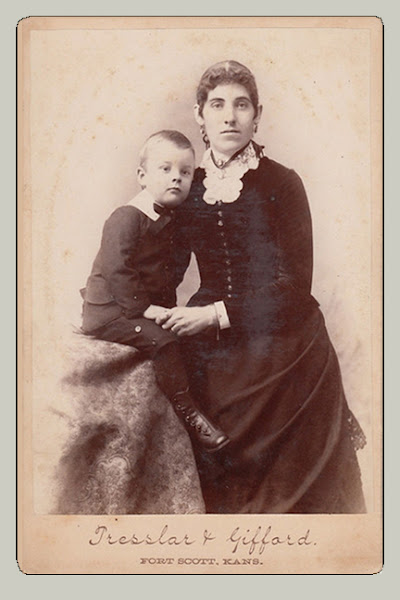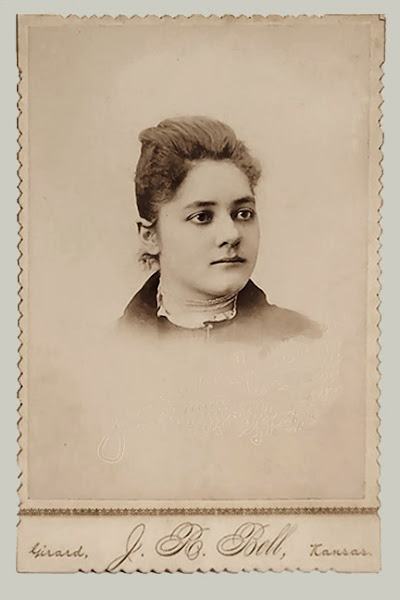Included on this special set of pages are Cabinet Card examples from just one state, Kansas. A sort of index. They are presented here in alphabetical order according to location.
Why Kansas?
In 1865, when the Cabinet Card size for photo mounts began its popularity, Kansas had only been a state for 4 years. Even today there are more than 400 towns with a population less than 400. Back then, even more. Where a Cabinet Card carries the name of the photographer and the town where he was working, the dates of city incorporation will be one clue to the date of the cabinet card.
Cabinet Cards were so popular and well known that in some photographer’s newspaper ads of the era, they were referred to merely as “Cabs”.
Cabinet Cards were so popular and well known that in some photographer’s newspaper ads of the era, they were referred to merely as “Cabs”.
Most say they eventually surpassed the popularity of the Carte de Viste format. See a brief history of the Carte de Viste.
Photographers often lived and based in a larger town and “worked” the neighboring smaller towns monthly or weekly. The passenger trains were very handy back then.
Where further information on a photographer is known, a link will be provided.
The central purpose in these pages is to help place a date on cabinet cards done by various photographers in various places. Here’s hoping you spot a card design or imprint that will help you date and identify that card in your collection.
These pages are for educational and informational purposes only. Any helpful suggestions are welcomed.
Kansas Cities, Towns, Burgs and Whistlestops in the late 19th century.
Promoting the care, understanding and collection of this unique format of 19th century photography. They are more than 100 years old. Handle with care.
Some examples on this page have been enhanced or restored for clarity
and presentation here.
This page is free for educational and research purposes only but, as
always, if the original owner of any of these examples objects to the
use on this page, just let me know and they will be immediately
removed.
See also:
Owlcation is an excellent site which examines the Kansas photographers of the 19th century. Follow the link
In 1854, the Kansas Territory was organized, then in 1861 Kansas became the 34th U.S. state. In 1855, Marion County was established within the Kansas Territory, which included the land for modern day Florence. -----Source: WIKI
1890
Fort Scott, KS
example from auction site
photographer dated: 1891
(Don't you wish they ALL had done this?)
1894
1896
203 and 205 Market Street, Fort Scott, KS
example from contributor
(greatly enhanced)
William T D'Ole had a studio in Kansas City, MO, in 1887 and 1888.
W T D’ole opened a photograph/artist gallery in Fort Scott, KS, Feburary of 1889. He and his brother Sam also manufactured emulsion photo paper. They moved back Michigan in October of 1891.
He died in 1936 at the age of 79.
Newspaper items and city directories indicate Tresslar was active in Fort Scott, KS, from late 1874 to about March of 1890. He moved to California.
Benjamin A Gifford worked as partner with E P Tresslar from March of 1886 to December of 1887.
209 Market Street, Fort Scott, KS
example from auctin site
(really low res scan)
Note the same props were used in the three cards at the left
example from auction site
Galena, KS, Newspaper mentions of Lydia Hills as photographer were found from 1893 to January of 1897. She died in January of 1897.
Garden City, KS
example from Kansas Memory
(Note the identical props in previous photograph)
Garnett was platted in 1857.
Garnett, KS
example from auction site
L D Walrad and Son, Harry, took over the Fifth Avenue Photography Gallery from H B Thompson who retired, in March of 1897. Harry and his brother Will also operated galleries at different times, in several small towns including Erie, Pittsburg, Wesphalia, and Fredonia, KS, and Blackwell, OK. L D Walrad was also quite active in city and county politics around 1900. The Walrad gallery operated in Garnett, KS, until about 1914.
Gaylord, KS
example from the Flickr collection of mj aux
(According to newspaper items, R B Miller took over the Hammond Studio in Gaylord, KS, in Sep 1897, working there until Oct 1898, when he and his family moved to Blue Rapids, KS.)
Girard was founded in the spring of 1868, in opposition to Crawfordsville, and named after the town of Girard, Pennsylvania, the former home of trustee Charles Strong. It was based around the surveyed line of the Kansas City, Fort Scott and Gulf Railroad, in an attempt to gain an advantage over its rival.
Eastside Square, Girard, Kans.
probably finished between 1888 and 1896 by
See also:James R Bell
example from LOST GALLERY
Girard, KS
example from annonymous contributor
(very modern setting for a 100 year old photograph)
Goodland was laid out in 1861. The town was named from the quality of its soil. A post office has been in operation at Goodland since 1861. One of the earliest pieces of recorded history relating to Goodland concerns the Kidder Massacre of 1867.
The first settlers of the area arrived in 1870. Living in sod houses and dugouts, they worked as buffalo hunters since trampling by bison herds precluded crop farming. In 1871, the Great Bend Town Company, anticipating the westward construction of the Atchison, Topeka and Santa Fe Railroad, founded Great Bend at a site roughly three miles west of Fort Zarah on the Santa Fe Trail. They named the settlement after its location at the "great bend" in the Arkansas River where the river's course turns eastward. The town began to grow as more settlers arrived over the following year and opened several businesses.
In 1873, following the arrival of the railroad, Great Bend became a shipping point for cattle. This stimulated local business but also transformed the city into a rowdy, violent cowtown. In 1876, the Kansas Legislature extended the legal "dead line" restricting the presence of Texas cattle 30 miles west of Barton County. The cattle trade moved westward accordingly, and the city became more peaceful. --Wiki
To date, NOTHING has been found about photographer Jones of Great Bend, Kansas.
At the present, it looks like photographer Jones must have been in business only a short time.
Gypsum City, KS
example from Kansas Memory
John A Kassebaum located his photo car in Gypsum, KS, 11 Mar 1892 and continued as photographer in that city at least until late 1894.
Grenola had its start in the year 1879 by the building of the railroad through that territory. At that time, the two rival cities of Green Field and Canola, which were three miles apart, relocated to the site of the railroad and merged. The name Grenola is a portmanteau of the names of the two former towns. ---Wikipedia
Not the one you were looking for? Here's the photographer's
INDEX by name.
All the Cabinet Card photographers of the 19th
century found in LOST GALLERY are listed there.
Cabinet cards typically have the photographer’s name and address printed on the bottom edge or the reverse of the card. 19th century photographers moved around a lot. The basic idea here is to find WHEN a photographer was WHERE, which will help date an unidentified CABINET CARD from your family album.
This is a work always in progress.
Aditional information and New examples are always welcome. Any
additional information will help narrow the time that these precious
antiques were made.
All submissions should be free of glare and
shadows.
Do not crop.
Leave a border around each card. The edges are
sometimes an important clue to the age of the card.
Email to the address found in the profile at the bottom of this page.
Some examples on this page have been enhanced or restored for clarity
and presentation here.
This page is free for educational and research purposes only but, as
always, if the original owner of any of these examples objects to the
use on this page, just let me know and they will be immediately
removed.











































































































































No comments:
Post a Comment